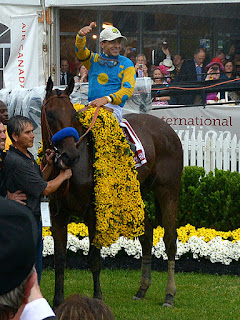 |
| "Exodus uit Messolonghi" door Theodore Vryzakis (1853) |
Ik zit in een “diner” in New York. “Diners”, een soort goedkope
Amerikaanse eetcafes, worden in New York grotendeels gerund door Grieken, velen
aangekomen na de Tweede Wereld Oorlog en na de Griekse burgeroorlog van
1946-1949. Zo’n 20.000 Grieken wonen nu voornamelijk in de wijk Astoria, ten
oosten van Manhattan aan de overkant van de East rivier gelegen. In Astoria zie je nog steeds veel Griekse
winkels, cafes, restaurants, en Grieks Orthodoxe kerken en als je de Griekse
tongval op straat hoort, waan je je, zeker in de zomer, even in het verre
Griekenland.
Terwijl mijn ogen over de menukaart glijden, moet ik denken
aan de vele stigma’s die de afgelopen tijd over Grieken zijn geuit in de Europese
en ook Amerikaanse media: Grieken zijn lui, corrupt en geven geld uit als water.
Nou zit er een kern van waarheid in als je kijkt naar de Griekse regeringen en
de oligarchen, maar geldt dat ook voor de gemiddelde burger? Mijn ervaring met Griekse “diners” laat een
ander beeld zien: drukdoende en hardwerkende Griekse uitbaters
en obers, velen die lange dagen werken, aangezien diners vaak 24 uur per dag
open zijn, iets wat je niet snel zal zien in het efficiente Duitsland of
Nederland.
Toch, Griekenland is meer dan die oppervlakkige
waarnemingen. Griekenland is niet alleen bakermat van de Westerse beschaving of
goedkoop vakantieland. Griekenland heeft een turbulente geschiedenis achter de
rug: vanaf de 15e eeuw driehonderd jaar
overheerst door het Ottomaanse rijk. Een
zwaarbevochten Duitse bezetting in de Tweede Wereldoorlog, gevolgd door een
splijtende burgeroorlog, met o.m. betrokkenheid van Groot Brittanie en de VS. Een militaire dictatuur van 1967 tot 1975.
Daarna tot 2015 regeringen die geleid werden door de socialistische PASOK
partij of de conservatieve Nieuwe Democratie partij, beide partijen verweven
met de corrumperende oligarchie in het land, en in die zin alle drie
verantwoordelijk voor de vele problemen die Griekenland plagen. Kortom niet een
land, waar simpele clichés op hun plaats zijn.
Hoe het Grieks drama ook afloopt, nu al staat vast dat
niet alleen de goede naam van de Grieken is beschadigd, maar ook de fundamenten
van de Europese Unie, zoals economische
samenwerking, politieke integratie en zelfs democratie. Zoals ik hieronder in vogelvlucht
zal schetsen is dit niet alleen veroorzaakt door de Grieken, maar door een patroon
van Euro-politici die gedurende meer dan twintig jaar forse inschattingsfouten
hebben gemaakt. Uiteindelijk zal heel
Europa hieronder lijden.



